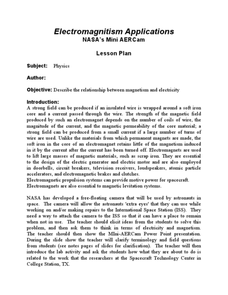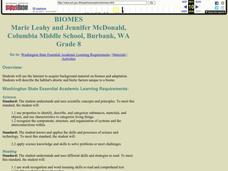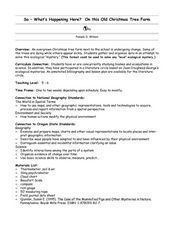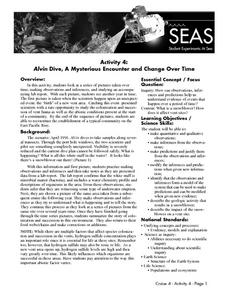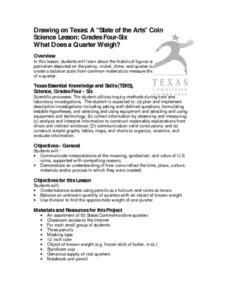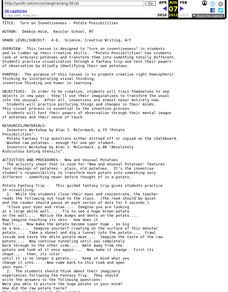Curated OER
Acid and Bases - Alien II
Eighth graders determine which of two solutions is more acidic by adding each to a given base. Students have to apply this analysis process to a problem scenario involving an alien creature.
Curated OER
Facts into Action
Students role play chosen scenario about smart decision making. For this drug awareness lesson, students discuss the danger associated with drug abuse. They practice how to make careful choices when faced with a difficult situation.
Curated OER
Classification
Students work in groups of 4-6 for the experiment/activity part of this exercise. They classify ten animals using the information on the picture to group the animals. Students develop descriptions, explanations, predictions, and models...
Curated OER
Fishkill
Students analyze data to determine the effect of thermal pollution on a certain species of fish. They graph temperature and dissolved oxygen and make inferences on the impact a change in temperature could have on the fish. As a class...
Curated OER
Solar System (Lesson 2)
Eighth graders identify the objects that make up the solar system. They define new vocabulary and practice using them. They discover that the sun is a star.
Curated OER
What Must Be Done To Achieve Equality?
Students evaluate various statements about what must be done to achieve equality for lesbian, gay, bisexual, and transgender persons, students consider the responsibility they have to end discrimination. They also explore the relative...
Curated OER
Electromagnitism Applications
Students experiment on magnets and electricity. In this physics lesson, students determine what factors affect the strength of a magnetic field. They design an experiment to determine how electromagnetic field strength varies with distance.
Curated OER
Peru's Earthquake
Young scholars identify the patterns of earthquakes by mapping USGS data and comparing it to mapped tectonic plates. They discover the relationship between earthquakes and the moving plates of the Earth's crust.
Curated OER
Where Are the Dinosaurs?
Students explore what the dinosaurs were like. In this dinosaur lesson, the teacher peaks student curiosity about dinosaurs. This lesson would be a great starting point for a dinosaur unit since it primarily engages student interest and...
Curated OER
Biomes
Eighth graders use the Internet to research biomes and how animals adapt. They describe habitat's features and factors that are unique to the biome they are researching. They also participate in activities.
Curated OER
So -- What's Happening Here? On this Old Christmas Tree Farm
Young scholars take a field trip to an old Christmas tree farm near their school. In groups, they gather data at the site and analyze the data in an attempt to discover what happened to the area. They identify human activities that led...
Curated OER
Activity 4: Alvin Dive, A Mysterious Encounter and Change Over Time
Students receive copies of the Time Series Observations to use for note-taking. They work in small groups to discuss what they see when the outside lights of Alvin are turned on, and off, where the bacteria may have come from. They view...
Curated OER
On the Surface
Students draw and label the 15 major rivers in Texas. They then draw and label another map with the major lakes and reservioirs of Texas. Students use the maps and locate and label the location of the following major Texas cities:...
Curated OER
Sea Ice Research
Learners study sea ice and its importance in climate and climate change. They discuss sea ice as a presence of a food source for marine animals in the arctic and complete a lab activity. After completing the lab, they watch a video...
Curated OER
What's That? Diversity Among Organisms
Seventh graders can go outside and explore the organisms that live in the environment outside their door. This is a wonderful opportunity for students to examine the world around them with a new perspective. This activity will increase...
Curated OER
Do You See What I See?
Pupils hypothesize the role of rocks, soil, and water by observing a terrarium and create a model to explore the water cycle. This is part of a five station set up.
Curated OER
Using the Microscope
High schoolers demonstrate their ability to properly make observations using a compound microscope. They prepare an onion skin slide and focus on it in both low and high power. Then they measure the diameter of one of the cells.
Curated OER
Surface Water Supplies And The Texas Settlements
Pupils engage in a lesson that is concerned with the allocation and finding of water resources. The location of different settlement areas is considered as one looks how the water is distributed. They map some of the early Spanish and...
Curated OER
Creative Ways To Teach Evolutionary Concepts
Students explore evolutionary concepts in cartoons and lab activities. They describe and explain evolutionary concepts featured in a cartoon and participate in laboratory activities.
Curated OER
The Consequences of Extinction
Pupils participate in a class discussion on site of an older style bridge to help connect the significance of each organism in an ecosystem by using an analogy of bolts slowly being removed from a working bridge.
Curated OER
Give Me Some Air!
Third graders examine how trees produce oxygen. They examine satellite images of the reservation they examining and interpret the number of trees on the land. They determine how natural resources should be used wisely.
Curated OER
Quarter Coin Cookies
Young scholars study the historical figures and symbols of U.S.
patriotism depicted on the penny, nickel, dime, and quarter coins. They explore the processes involved in making coins, and how metals canchange in consistency from the...
Curated OER
What Does a Quarter Weigh?
Learners study the historical figures and symbols of U.S.
patriotism depicted on the penny, nickel, dime, and quarter coins. They
create a balance scale from common materials to measure the approximate weight
of a quarter.
Curated OER
Turn on Inventiveness
Learners practice visualization through a fantasy trip and test their powers of observation by blindly identifying their own potatoes.








